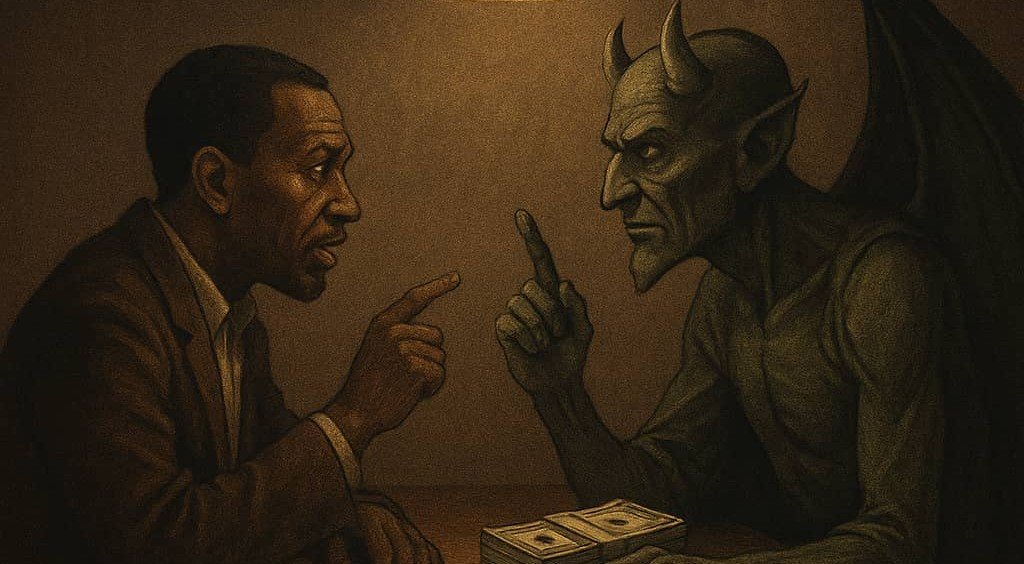By Isaac Christopher Lubogo
Epigraph
“Money answereth all things.” — Ecclesiastes 10:19
“The love of money is the root of all evil.” — 1 Timothy 6:10
“It is not the man who has too little, but the man who craves more, that is poor.” — Seneca
A Conversation with Money
Lubogo:
Money, you elusive demon dressed as an angel, why do you run when I stretch my hand, and return when I least expect you? Among the Baganda they say “Sente mukisa gugya negudayo”—money is but luck, fleeting as the morning dew. Tell me, how can one tame you?
Money (smiling with arrogance):
I was never meant to be tamed. I am not a dog to be leashed nor a servant to be ordered. I am the shadow of human desire. The preacher wrote, “Money answereth all things” (Ecclesiastes 10:19), and yet the same scripture whispers that “the love of money is the root of all evil” (1 Timothy 6:10). Do you see the irony? I am both the solution and the problem, the balm and the poison.
Lubogo:
So then you are a paradox—life’s cruel riddle. When you enter my pocket, my neighbors bow, my children smile, my stomach fills. But when you flee, shame replaces honor, friends vanish, and pride becomes dust. Why are you the measure of man, when philosophy has told us that virtue, not wealth, should define greatness?
Money:
Because man is weak. Plato dreamt of philosopher-kings guided by wisdom, yet even his Republic needed coin to be built. Aristotle said wealth is only useful as a means to a higher end, but humans made me the end itself. Nietzsche would laugh at your morality—he saw beyond good and evil, and in me he would say your will to power is clothed.
Lubogo:
But is it not true, Money, that you corrupt? Empires fall when you sit at their heart. Families shatter when you whisper greed into lovers’ ears. Wars erupt, politicians sell their souls, and friendships die because of you. Even Shakespeare had Shylock cry out for his “ducats” louder than his daughter. You are both gold and gall.
Money (with a sigh):
Do not blame me. I am but paper, metal, or now digital code. The evil lies not in me but in the hunger I awaken. As Seneca said, “It is not the man who has too little, but the man who craves more, that is poor.” I only reflect the emptiness of men’s hearts.
Lubogo:
Then why, Money, do you also bring dignity? Without you, the doctor refuses treatment, the landlord denies shelter, and even the priest demands an offering. Can man live without you?
Money:
No man can live without me in this world of transactions. I am the blood of the market, the oil of civilization. Without me, nations collapse into barter and chaos. I am not evil; I am neutral. As the Baganda proverb says, I come and go—your task is not to cage me, but to learn to dance when I visit and endure when I depart.
Lubogo:
But if you cannot be tamed, then how do I live with you?
Money (with a sly grin):
Treat me as fire. Use me to cook your food, not to burn your house. Let me serve your vision, not enslave your soul. As the sages teach: love people, use money—not the other way round. If you chase me, I will mock you. But if you chase purpose, I will follow you like a loyal servant, for I am always drawn to value.
Lubogo (after a long silence):
So you confess you are both God and Devil, miracle and curse, truth and lie. You are the laughter of fortune and the tears of greed. Perhaps the wisdom of Uganda is right: you are pure luck, and luck cannot be chained.
Money (whispering like a tempter):
Yes, Isaac. But remember—though I come and go, how you use me echoes beyond death. In your hands, I can be vanity or virtue, tyranny or liberation. Choose wisely.
Closing Reflection
Money speaks as a mirror of humanity’s contradictions. As Augustine once warned, “The world is a book, and those who desire gold more than wisdom read only one page.” Yet we must live in this book with all its chapters—some written in hunger, some in abundance.
Money is neither angel nor demon. It is the stage upon which the human soul reveals its deepest truth.
# Suigeneris








